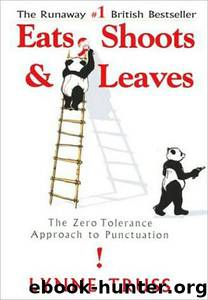Eats, Shoots & Leaves by Lynne Truss

Author:Lynne Truss
Language: eng
Format: mobi, epub
Tags: Reference
ISBN: 9781101218297
Publisher: Penguin Group (USA)
Published: 2003-01-02T00:00:00+00:00
The big final rule for the comma is one that you won’t find in any books by grammarians. It is quite easy to remember, however. The rule is: don’t use commas like a stupid person. I mean it. More than any other mark, the comma requires the writer to use intelligent discretion and to be simply alert to potential ambiguity. For example:
Leonora walked on her head, a little higher than usual.
The driver managed to escape from the vehicle before it sank and swam to the river-bank.
Don’t guess, use a timer or watch.
The convict said the judge is mad.
In the first example, of course, the comma has been misplaced and belongs after “on”. The second example suggests that the vehicle swam to the river-bank, rather than the passenger. It requires a comma after “sank”. The third is pretty interesting, since it actually conveys the opposite of its intended meaning. What it appears to say is, “Don’t guess, or use a timer or a watch”, when in fact it only wants to tell you not to guess. It therefore requires a semicolon or even a full stop after “guess”, rather than a comma. The fourth makes perfect sense, of course – unless what’s intended is: “The convict, said the judge, is mad.”
Two particular stupid uses of the comma are proliferating and need to be noted. One is the comma memorably described in the “This English” column of the New Statesman in the late 1970s as “the yob’s comma”: “The yob’s comma, of course, has no syntactical value: it is the equivalent of a fuddled gasp for breath, as the poor writer marshals his battered thoughts.” Examples cited in the New Statesman included this, from The Guardian:
The society decided not to prosecute the owners of the Windsor Safari Park, where animals, have allegedly been fed live to snakes and lions, on legal advice.
The comma after “animals” is not only ungrammatical and intrusive, but throws the end of the sentence (“on legal advice”) into complete semantic chaos. Meanwhile, moronic sentences such as “Parents, are being urged to take advantage of a scheme designed to prevent children getting lost in supermarkets” and “What was different back then, was if you disagreed with the wrong group, you could end up with no head!” are observably on the increase.
Less stoppable is the drift towards American telegraphese in news headlines, where the comma is increasingly given the job of replacing the word “and”. Thus:
UK study spurns al-Qaeda, Iraq link
Mother, three sons die in farm fire
Download
This site does not store any files on its server. We only index and link to content provided by other sites. Please contact the content providers to delete copyright contents if any and email us, we'll remove relevant links or contents immediately.
| Slang & Idioms | Vocabulary |
| Word Lists |
Cecilia; Or, Memoirs of an Heiress — Volume 1 by Fanny Burney(31348)
Cecilia; Or, Memoirs of an Heiress — Volume 3 by Fanny Burney(30946)
Cecilia; Or, Memoirs of an Heiress — Volume 2 by Fanny Burney(30905)
The Lost Art of Listening by Michael P. Nichols(6481)
We Need to Talk by Celeste Headlee(4879)
Asking the Right Questions: A Guide to Critical Thinking by M. Neil Browne & Stuart M. Keeley(4592)
On Writing A Memoir of the Craft by Stephen King(4221)
Dialogue by Robert McKee(3589)
I Have Something to Say: Mastering the Art of Public Speaking in an Age of Disconnection by John Bowe(3518)
Pre-Suasion: A Revolutionary Way to Influence and Persuade by Robert Cialdini(3421)
Elements of Style 2017 by Richard De A'Morelli(2945)
The Book of Human Emotions by Tiffany Watt Smith(2776)
Good Humor, Bad Taste: A Sociology of the Joke by Kuipers Giselinde(2558)
Name Book, The: Over 10,000 Names--Their Meanings, Origins, and Spiritual Significance by Astoria Dorothy(2495)
Fluent Forever: How to Learn Any Language Fast and Never Forget It by Gabriel Wyner(2449)
The Grammaring Guide to English Grammar with Exercises by Péter Simon(2397)
Why I Write by George Orwell(2362)
The Art Of Deception by Kevin Mitnick(2301)
Don't Sleep, There Are Snakes by Daniel L. Everett(2220)
